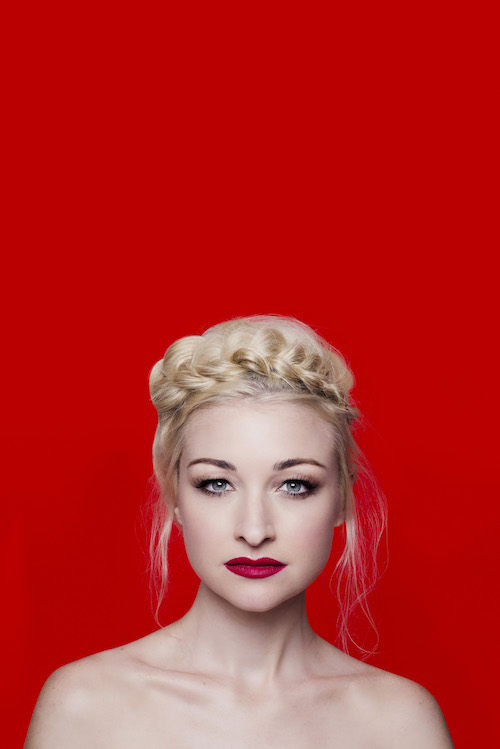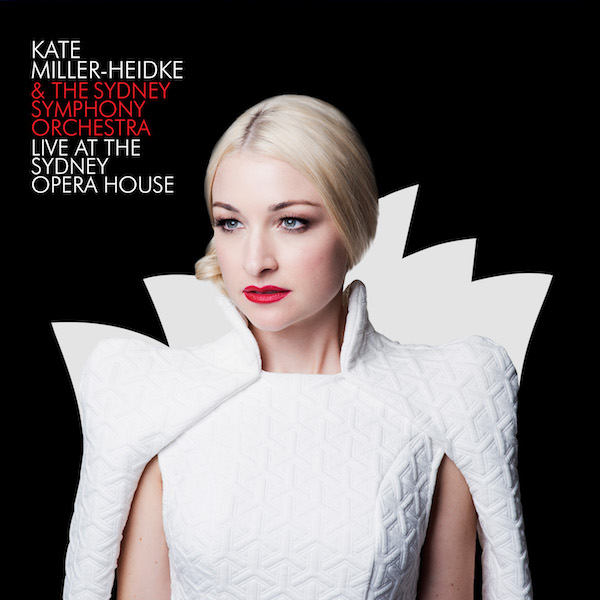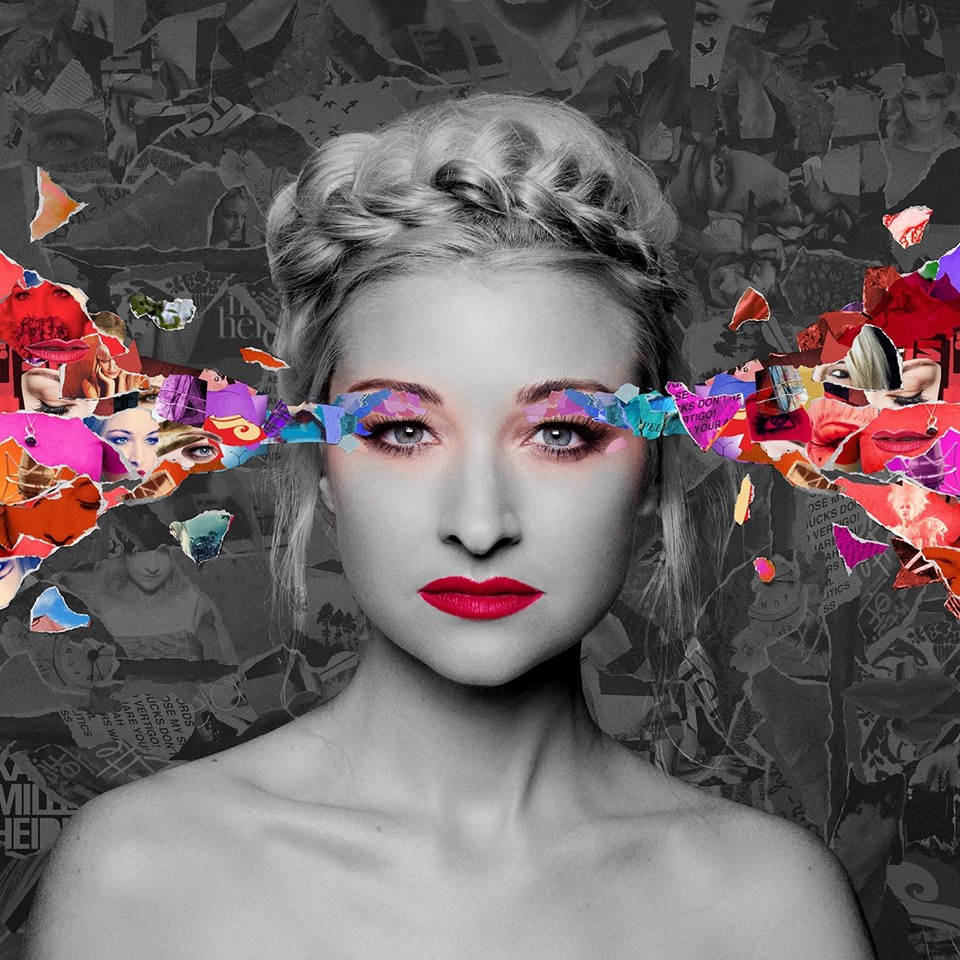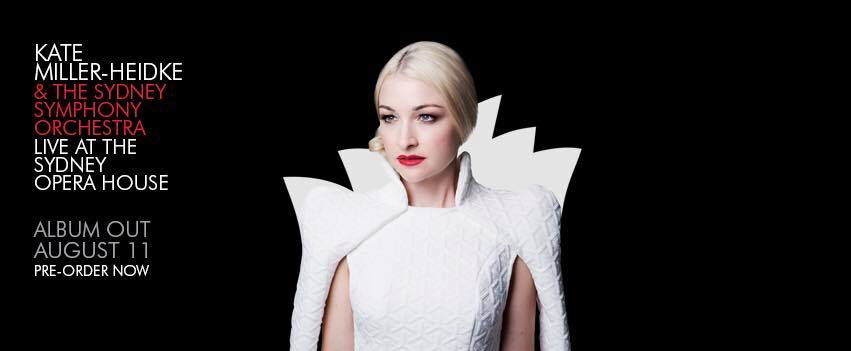Project Description
Interview with
KATE MILLER-HEIDKE
Interviewer – Dave Bruce
Questions – Julie Ink-Slinger, Dave Bruce
.
.
Kate Miller-Heidke is a classically trained, award winning Australian singer-songwriter who has followed her classical singing accomplishments with a career in alternative pop. In March of this year, Kate performed with The Sydney Symphony Orchestra at The Sydney Opera House which resulted in her latest album, “Live at the Sydney Opera House”, to be released August 11.
.
.
Julie – Congratulations Kate on performing with The Sydney Symphony Orchestra at The Sydney Opera House, accompanied by the release of the recording, “Live at the Sydney Opera House”. I have been fortunate enough to listen to the record and the songs, and your vocal abilities, are exemplary. As a classically trained artist performing in concert with such an acclaimed orchestra, what was that experience like for you?
Kate – I don’t think I’d be exaggerating if I said in some ways it felt like the pinnacle of a career. Three nights with the Sydney Symphony at the Opera House really felt surreal. It’s the kind of moment that many artists dream about. A part of me doesn’t quite believe it happened. I’m glad I have the recording so I can prove it to my grandchildren.
Dave – Reflecting on this huge event in your life are you able to stay present to the experience and soak it in, and do you get really nervous given the surroundings?
Kate – I definitely get nervous. I get nervous before every show and I always have. There have been a few shows in my life where I haven’t been nervous because I’ve been too tired or hung over or whatever and those shows have always been terrible. I get very nervous and Keir, my partner and collaborator, say an atheist prayer together before each show and consciously remind ourselves to try and stay in the moment, which is sometimes difficult if you are trying with all your might for the wheels not to fall off. Especially with a full orchestra, some 50 people, who are all relying on me not to muck it up, not to forget a lyric, you know, mess with the structure. So there are those brief glimpses of moments where you can soak it all in and a lot of the rest of the time is spent basically terrified haha.
Dave – After the show is it easy to come back to Earth?
Kate – Things are different for me now I have a baby. I go and sign CDs sometimes for an hour or two after we’ve all shared that experience and then I go home to bed. My baby wakes up about 5:30am so I have to get back to normal quickly otherwise my stamina would suffer greatly.
Julie – If I may digress, Billy Joel heard from fans and his band that many of his songs sounded better performed live than the studio recordings. Consequently, Billy Joel and his producers remixed fan favourite, live tracks and released the album “Songs in the Attic”. Your latest record, “Live at the Sydney Opera House” will be released on August 11. How alike, and how disparate, are the live recordings of your songs compared to the studio recordings?
Kate – They’re very different. I mean in this case they’ve been reinvented through the symphonic arrangements. These versions of these songs a very much a collaboration between Kier, me and whomever has arranged the song. Kier is my guitarist and co-writer and most of the stuff we wrote together. So it’s a collaborative effort between us, the arranger and the orchestra itself. I agree with Billy Joel that live recordings are different. For me I’ve performed these songs so many time they evolve over time. The best songs are living, breathing organisms that change and grow every time you perform them. So in that way, often I prefer live recordings to the original studio recording. Sometimes the studio recording has a beautiful freshness about a new song. It can be “electric” and it can “crackle” a bit when you surprise yourself in the studio, but live recordings can often have more of a lived in, cosy t-shirt vibe about them. Both are special but for me I suppose I’ve always seen live performances at the core of what I do, so I’m happy to have as many live recordings out there as possible.
.
.
Dave – As far as this “live” performance, working with the Philharmonic Orchestra is like a “once in a lifetime” opportunity.
Kate – You’re right. And even to take the Sydney Symphony Orchestra into a studio would cost so much money that it would not be viable, so this is the only way it was ever going to happen for me really.
Julie – You completed a Bachelor of Music in Classical Voice from the Queensland Conservatorium of Music (QCOM) and a Master of Music at the Queensland University of Technology. What persuaded you to enrol in, and complete, these degrees?
Kate – I knew I loved to sing and I had a singing teacher that encouraged me to try classical stuff and it turns out my voice was well suited to it. So I was good enough to get into the Con (QCOM) and at that point there were no popular music courses. Even though I loved song writing and I felt on some deep level that I was a Songwriter, all I knew was that I wanted to do music and it seemed the obvious path.
Dave – How far away does that time feel today? As a popular artist today how do you stay grounded?
Kate – Really far away actually. Thanks for the compliment and I am really grateful I have had a long-term career that looks like it is sustaining itself, thank God. Not many people get to say that, but it’s not as though I could just retire on a yacht tomorrow. I need to keep creating, I need to make music to live, so that’s the situation I’m in and I feel that keeps me grounded. There’s no paparazzi following me around. I am a bread and butter musician.
Julie – As a classical singer you have earned several awards including the Elizabeth Muir Prize (2000), the Donald Penman Prize (2001), the Linda Edith Allen Memorial Prize (2002) and the Horace Keats Prize (2002). How gratifying were these accolades?
Kate – They were especially gratifying if they had prize money attached I remember. I was always given lots of encouragement in my classical career. I feel like it could have been a viable option for me to be a classical opera singer if I’d wanted it and really pursued it. But there was just a part of that world that never fully satisfied me. I just felt that I never had enough input into the creative process. On some level as a classical singer you are always being told what to do by someone else and that’s what wasn’t working for me.
.
.
Dave – Do those people related to those Awards come calling these days?
Kate – I’ve been lucky enough to keep one foot in the classical world. It provides a great variety in my life and keeps me challenged. A couple of years ago I actually sung in an opera at the Met (The Metropolitan New York), which was an incredible experience. I also wrote a children’s opera, “The Rabbits”, for Opera Australia and sang in it as well and that had four seasons around Australia. I still feel like I’m in touch with that world but thankfully no-one asks me to teach them to sing because I’m a terrible teacher.
Dave – Do you have to do any special training to maintain those operatic demands?
Kate – I still do all my classical warm-ups. If I’ve got a more classical style gig coming up I’ll try to hone that technique in the months leading up to it, but you’re right, it’s a muscle and you have to keep it activated. Generally I have lent towards the gigs that embrace my weird, hybrid vocal style. It’s not as though I could step in tomorrow and sing a Mozart style opera, but I have invented my own technique that works for me, but it would not pass the sniff test on a purely operatic level.
Julie – You performed with various Brisbane bands prior to going solo as an alternative pop artist in 2002. What factors contributed to your decision to pursue a solo career in popular music?
Kate – I had one band called “Elsewhere” and fell in to that regular trap of going out with one of the guys in the band and of course, we broke up. After that it made sense to go solo. There was no other band there waiting for me.
Dave – Are you strict solo or do you entertain teaming up with a band again?
Kate – I would actually love to join a band. People haven’t asked me really. I mean, I’ve had a few drunken conversations with friends about it, but down the track it’s something I’d love to do. I’d love to really collaborate and write music with the band. Especially if it were some sort of “supergroup”, I’d be totally into that.
.
.
Julie – In the year 2000, 2004 and 2005 you released three EPs of original material. However, you stated during an interview in 2007 that the comedic material in your second EP, Comikaze, was a mistake and you stopped pressing copies. Why was the comical material a mistake?
Kate – Because I love novelty songs and they have always been a part of my live set but I feel like they need that live energy to come across. On a recording, it goes back to something I said before, it felt like a really sterile way to record a comedy song. I think they live and breath with the laughter, with the audience reaction. When you strip that away it sounds sterile and in my mind, in my opinion, it doesn’t stand up to repeated listens either. A novelty song dates very quickly.
Julie – “Space They Cannot Touch”, from your EP, Telegram, became a hit on youth radio and Triple J, significantly increasing your Australian fan base. You consequently toured throughout Australia, appearing on shows including Spicks and Specks and Rove and twice at the ARIA Music Awards. You released your debut album Little Eve in 2007 which went gold and your second album Curiouser in 2008 which reached number 2 on the ARIA Top 50 Albums chart which also received critical acclaim in America. Your following single, “The Last Day On Earth” reached #3 in Australia. Given your significant accomplishments in classical singing, how did it feel to make such a successful transition to contemporary pop?
Kate – The transition had been a while coming by that point because I’d really capsized in the classical world around 2005 before releasing my first EP with Sony I guess you could say. So it had been something I had been working on for a while. It wasn’t an overnight thing.
Dave – Was the transition commercially based?
Kate – No, no, I just needed to write songs. I wanted to just write songs and then sing them. I had always written songs from when I was 14 or so, and I just kind of found myself in the classical world. When I did transition it felt like a vindication that I had made the right decision. It felt amazing. It’s amazing to have a song in the charts. At that point in my life I felt like I could never envision myself back in the opera world. Still, at the same time as when “The Last Day On Earth” was a hit, I found myself performing in “Jerry Springer – The Opera” at the Opera House and loving that.
.
.
Julie – Between 2009 and 2014 you returned to theatrical productions playing Baby Jane in Jerry Springer: The Opera and the British Dancing Girl in The Death of Klinghoffer. What was the experience like for you, creatively speaking, to rediscover theatrical performance?
Kate – I have to say that I have always found playing a character to be enormously liberating. It feels like getting a break from myself, getting out of my head. It’s almost like another art form that refreshes me when it comes to writing my own stuff.
Dave – Is acting on the cards?
Kate – I can’t imagine doing straight acting, no. I have been in a TV series but it was mostly all sung. I’m very much a singer and I like to tell stories on stage and be part of a cast, and all that sort of thing.
Julie – You co-wrote the song “Caught in the Crowd” with your husband Keir Nuttall. The song was accredited Gold and you were awarded the $US25,000 grand prize in the 2008 International Songwriting Competition. Can you describe the experience of being the first Australian singer-songwriters to receive such an illustrious honour?
Kate – All I can say is that it felt great and we really needed the money at that time. It was amazing. That’s one of those songs that continues to have a life. It’s a song that’s given us so much, both of us. It’s now being taught in high schools, and teachers go through the lyrics with their students and talk about bullying and standing up for your friends. It’s a very special song to me.
Julie – I studied bullying at university and identified three main players: The bully, the victim and the irresponsibly overlooked bystander. “Caught in the Crowd” recounts the tale of the bystander who wants to safeguard the victim but fears being ostracised by students. Australian educators were so impressed by the single it was incorporated into anti-bullying programs. Along these lines, teaching bullies about the devastating effects of their behaviour and reassuring victims that their bullying experiences are being taken seriously are lessons routinely taught in schools these days. However, what about the role of the bystander? There are those who appear indifferent to the brutality inflicted by bullies upon victims. Alternatively, there are “Caught in the Crowd” bystanders who vacillate between helping stop the victimisation and fearing being shunned by peers as well as the wrath of the bully. What lessons about the role of bystanders do you consider ought to be included in anti-bullying education?
Kate – I’m not an expert in education. I do remember for me, when I was bullied in school, it was the failure of a couple of people, who I considered to be my close friends, to take my side, which hurt the most. Definitely. I suppose it’s hard being an adolescent. It’s great that the kids are talking about it at least. We never spoke about it when I was there.
.
.
Julie – You have toured extensively throughout the US, UK and Europe and played festivals including Coachella, Lilith Fair and the Byron Bay Bluesfest. How gratifying is playing live to responsive, appreciative audiences having a ball?
Kate – When you go to a Festival, they are definitely there to have fun, but you have to win them over, which is a challenge. That’s actually the part I love about Festivals. A lot of the fans at a Festival may have never seen me before and don’t know my songs. They may say, “I’ve seen that name before, I’ll give her a go”. In terms of my headline tours I have a pretty loyal fan base, people that tend to come back again and again. I can stretch them and play lesser-known stuff. You can take more risks. But I absolutely love playing Festivals, I love the vibe, the energy of people you surprise. Woodford Folk Festival in particular has been a big part of my life (Kate was named the Queen of Woodford back in 2002/3) as I started going there when I was 16 and learnt a lot about songwriting watching the master songwriters there. It’s a yearly ritual for us to go up to Woodford.
Julie – You revisited your love of classical singing in 2013, playing Amber in the opera Sunken Garden. In 2014, you were asked to write an opera based on the children’s book, The Rabbits to be performed in 2015. You are presently co-writing the music and lyrics for the musical Muriel’s Wedding, which will premiere in November 2017. You epitomise the person with a strong work ethic, compelled to create, as confirmed by your comprehensive body of work. Firstly, do you concede you are a bit of a workhorse who is perpetually driven to create? Secondly, do you allow yourself an occasional day off, and if you do, what would that day usually look like?
Kate – I certainly give myself days off. Having a child has certainly shaken things up a lot. We’ve got a fair bit of help with him, which is lovely, because I don’t think I have the temperament to be a stay at home mother. I’ve had to figure out a way to keep working on all the creative stuff and just all the deadlines I set myself. I don’t think I ever had the goal of being a workhorse, but I do think I have always had a problem saying no, and so that’s just meant I have a bunch of deadlines and I just have to meet them.
Dave – Is it “work” or do you see it as just “life” in a “conscious” sense.
Kate – That does resonate with me on one level, but quite often it is “work” and if I don’t do it, I’m going to be miserable, so I have to push through, and do the thing, and then I will be happy. I think a lot of writers that I’ve read about say the same thing. It’s tough to write, it’s awesome to have written. That’s kind of how it works for me.
.
.
Julie – Lastly, Kate, is your creative ingenuity an intrinsic character trait that has been evident since your earliest childhood and, if so, can you recount some of your artistic endeavours from childhood and beyond?
Kate – I think I was always the showoff as a kid, that’s for sure, and I liked being the centre of attention. I loved using my voice really, I sang so much, I basically never shut up. So of course, eventually I got a fair bit of facility with my voice because I used it so much. Like anything, it’s about practice. I loved being in amateur musicals when I was young. I was in Oliver a few times and all the school musicals. I remember I actually received an award when I was about 10 or 11. I was in the children’s chorus of Oliver and I received a statue of a pig that was a Hamlet award for overacting. Even as a child I was a terrible over-actor and I was thrilled with it. It was basically an insult this award and I gave it pride of place in my cupboard.
Dave – Have we missed anything? Anything coming up you’d like to mention?
Kate – We didn’t get to talk much about Muriel’s Wedding, which is the next big think for us. It’s opening in November in Sydney with the Sydney Theatre Company and it’s something that Kier and I have been working on for nearly three years.
Dave – What are you looking forward to about it?
Kate – I think opening night is going to be a trip. I’ve never got to sit in the audience and watch. Normally I am on stage with the nerves, and this time it will be very different being out there where I can see the faces of the audience. There is so much work that has gone into this and it has been such a joy. Ticket sales are going really well and they have sold out a lot of it. The film has such a cult following. I am looking forward to the whole experience greatly.
Dave, Julie – Thanks Kate for your time today. It has been fun for me. Good luck with everything coming up.
Kate – I enjoyed it too. Thanks Dave. Bye.
.
.
Follow KATE MILLER-HEIDKE
Website Facebook Twitter Instagram
.











